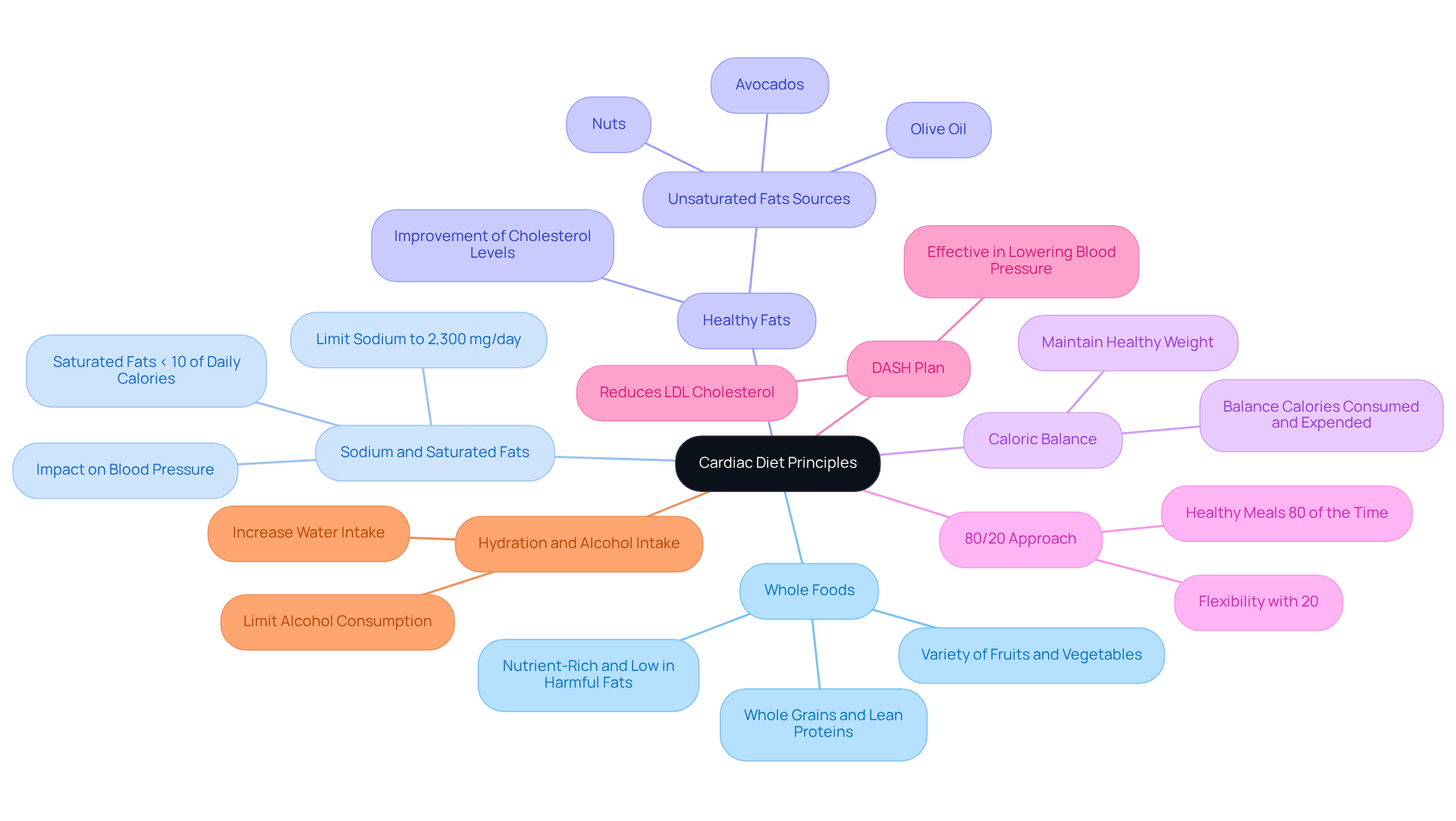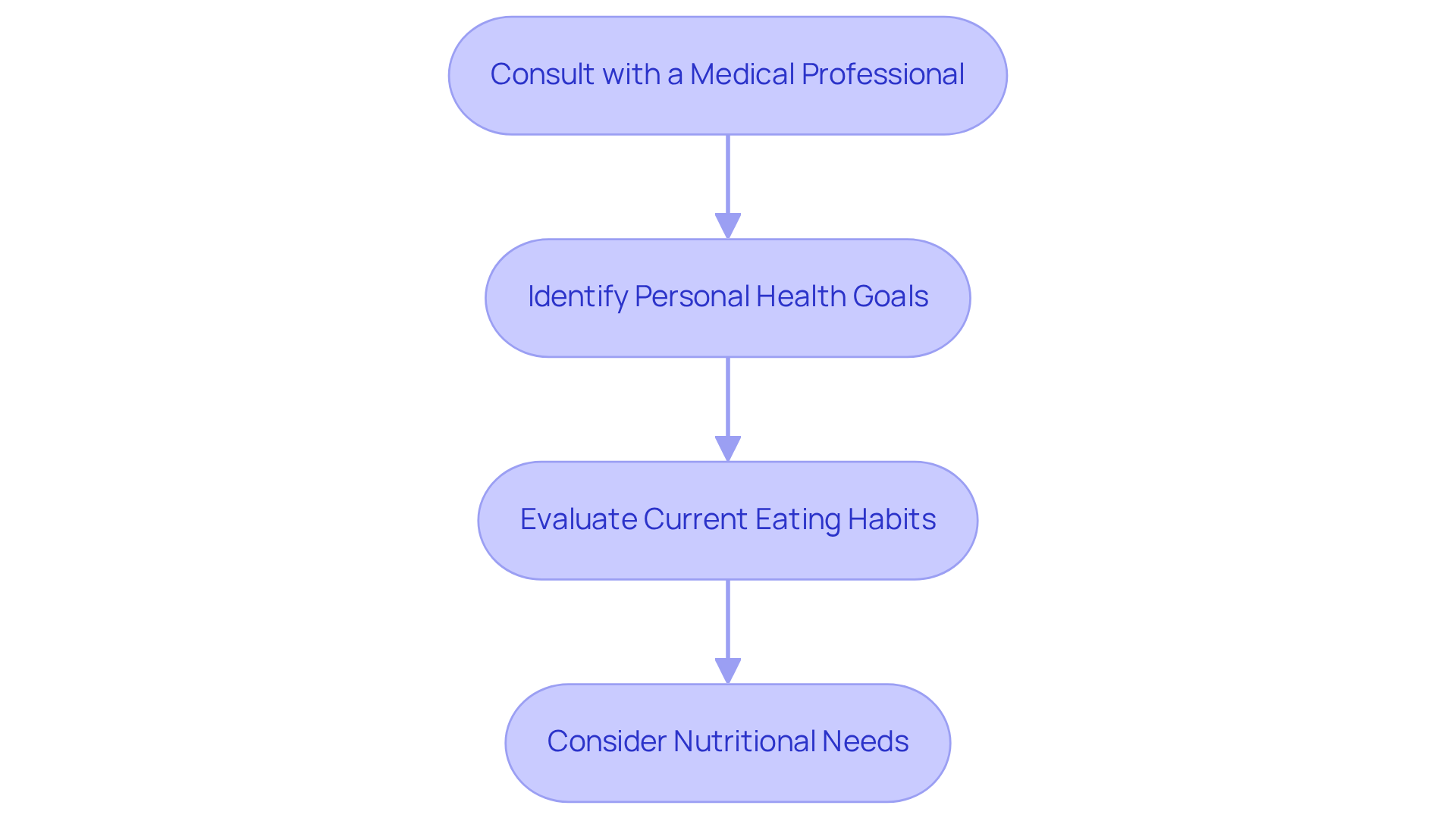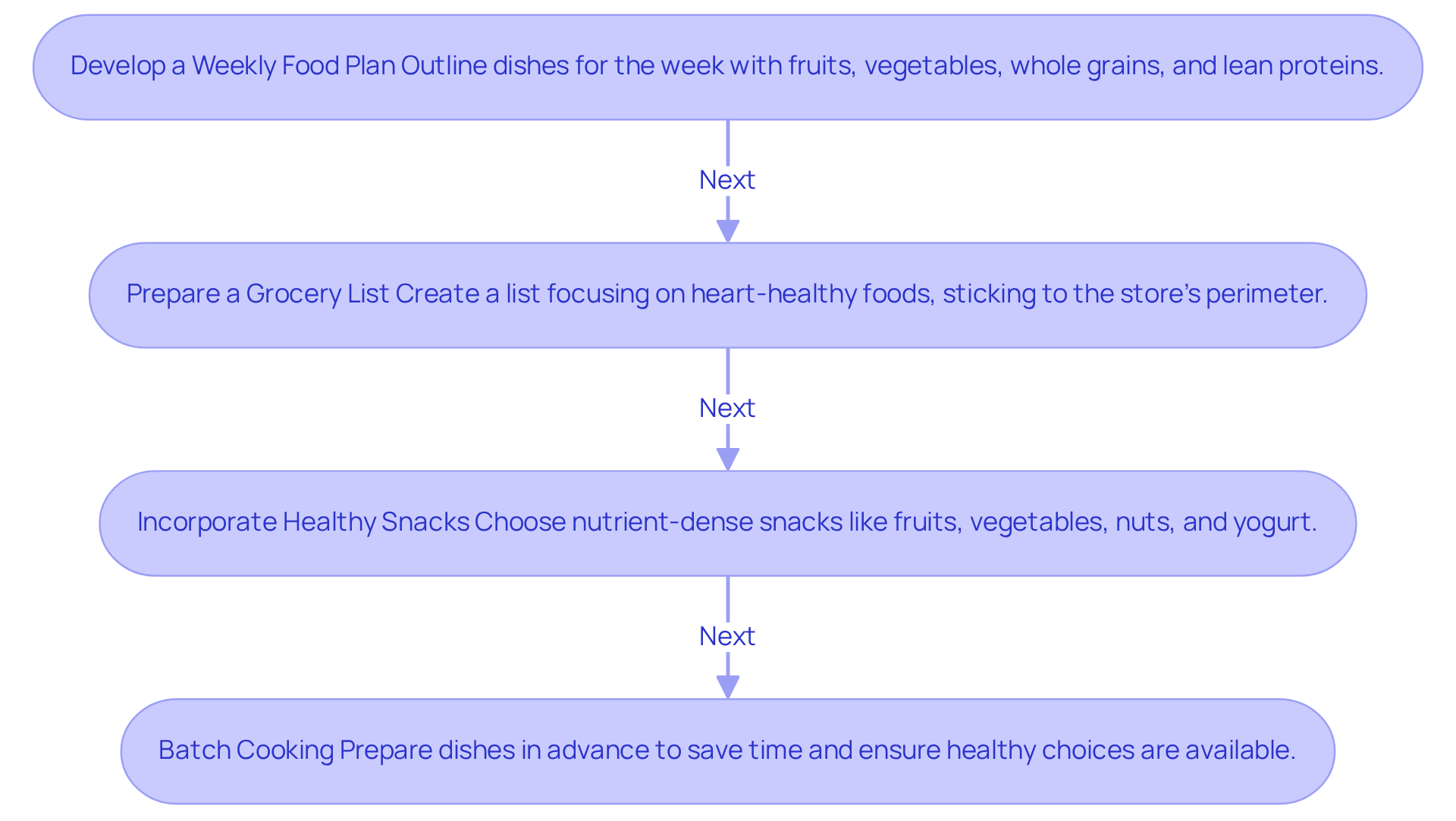


Creating a cardiac diet plan can feel overwhelming, but it doesn't have to be. It involves four essential steps:
Each of these steps is designed with your well-being in mind, emphasizing the importance of whole foods, limiting harmful ingredients, and maintaining a balanced approach to ensure sustainable heart health.
By taking the time to understand these principles, you can feel more in control of your health journey. Assessing your dietary needs allows you to tailor your plan to what works best for you. Planning meals and snacks that are both nutritious and delicious can make a significant difference in how you feel day-to-day. And remember, implementing strategies for long-term adherence means that you’re not just making temporary changes; you’re embracing a healthier lifestyle for the long haul.
We’re here to support you every step of the way. If you have any questions or need assistance in creating your personalized cardiac diet, please don’t hesitate to reach out. Your heart health is important, and with the right guidance, you can achieve a balanced and fulfilling diet that supports your overall well-being.
Creating a cardiac diet plan is crucial for anyone wishing to protect their heart health, particularly in a world where cardiovascular diseases are a leading cause of mortality. This article explores practical steps that empower you to make informed dietary choices, highlighting the importance of whole foods, healthy fats, and mindful eating. Yet, with the overwhelming amount of conflicting nutritional advice available, how can you navigate the complexities of heart-healthy eating and ensure lasting adherence to a cardiac diet?
It's understandable to feel uncertain or anxious about making dietary changes. Many individuals share similar concerns, and it's important to recognize that you're not alone in this journey. By focusing on simple, actionable steps, we can work together to create a sustainable approach to heart health. Remember, every small change counts and contributes to your overall well-being.
In addition to this, embracing a diet rich in whole foods and healthy fats can be both nourishing and satisfying. It's about finding balance and making choices that resonate with your lifestyle. You deserve to feel empowered in your dietary decisions, and with the right guidance, this can be achieved.
Furthermore, consider reaching out for support from healthcare professionals or nutritionists who can provide personalized advice tailored to your needs. It’s perfectly okay to seek help—taking that step shows your commitment to your health. Together, we can navigate this path toward a heart-healthy lifestyle, ensuring that you feel supported every step of the way.
A cardiac diet plan is thoughtfully crafted to help reduce the risk of cardiovascular illness through mindful food choices. Let's explore some key principles that can guide you toward better heart health:
Emphasizing Whole Foods: It's important to focus on incorporating a variety of fruits, vegetables, whole grains, and lean proteins into your meals. These foods are not only rich in nutrients but also low in harmful fats, which is essential for maintaining cardiovascular well-being. Research indicates that diets high in whole foods significantly lower the risk of coronary artery disease.
Limiting Sodium and Saturated Fats: You may be aware that excessive sodium intake is linked to hypertension, while high levels of saturated fats can elevate cholesterol. It’s advisable to keep sodium intake below 2,300 mg per day and limit saturated fats to less than 10% of your total daily calories. Studies have shown that individuals who reduced their sodium intake experienced notable improvements in blood pressure, which is encouraging.
Incorporating Healthy Fats: Unsaturated fats, found in foods like olive oil, avocados, and nuts, are beneficial for your cardiovascular wellness. These fats can help improve cholesterol levels and support overall heart function, making them a great addition to your diet.
Balancing Caloric Intake: Achieving and maintaining a healthy weight is vital, and this requires a balance between the calories you consume and the energy you expend. Weight management plays a significant role in reducing heart disease risk, so it’s important to be mindful of this balance.
The 80/20 Approach: Experts recommend the 80/20 approach to healthy eating, where you enjoy healthy meals 80% of the time, allowing for some flexibility with the remaining 20%. This approach can help you maintain a balanced eating plan while still indulging in occasional treats, which is perfectly okay!
The DASH Plan: The Dietary Approaches to Stop Hypertension (DASH) program is well-regarded for its effectiveness in lowering high blood pressure and LDL cholesterol. By integrating concepts from the DASH diet, you can further enhance your cardiovascular well-being.
Hydration and Alcohol Intake: Don’t forget that increasing your water intake and limiting alcohol consumption are also important for overall health. Staying hydrated supports bodily functions, while excessive alcohol can negatively impact your heart health.
By following these principles, you can make informed dietary decisions that enhance your cardiovascular well-being and support a cardiac diet plan, potentially lowering the risk of cardiac disease. Remember, heart disease is the leading cause of death in America, responsible for one in five deaths. Making these dietary changes is crucial, and you are not alone in this journey. Support is available, and every small step you take is a step toward a healthier heart.

To effectively assess your dietary needs and health goals, it’s important to approach this process with care and understanding. Here are some steps to consider:
Consult with a Medical Professional: Before making any significant nutritional changes, it’s wise to speak with a healthcare expert. They can help you discuss any existing medical conditions and medications that may influence your eating habits, ensuring your journey is safe and tailored to your needs.
Identify Personal Health Goals: Take a moment to reflect on what you want to achieve with your nutrition. Whether it’s lowering cholesterol, managing blood pressure, or losing weight, understanding your goals is a crucial step toward a healthier you.
Evaluate Current Eating Habits: Consider keeping a food diary for a week to track what you eat. This practice can help you uncover patterns and identify areas for improvement, guiding you toward more mindful choices.
Consider Nutritional Needs: It’s essential to evaluate your nutritional requirements based on factors like age, gender, activity level, and any medical conditions. For instance, older adults may need more calcium and vitamin D to support their health.
By thoroughly assessing your dietary needs and health goals, you can develop a more effective and personalized cardiac diet plan. Remember, you are not alone on this journey; support is available, and taking these steps can lead to a healthier, happier life.

To effectively plan heart-healthy meals and snacks, it’s important to follow these essential steps with care and consideration for your well-being:
Develop a Weekly Food Plan: Begin by outlining your dishes for the week, ensuring you include a diverse mix of fruits, vegetables, whole grains, and lean proteins. For instance, consider preparing grilled salmon with quinoa and steamed broccoli, a delightful option that aligns with the Pesco-Mediterranean lifestyle, known for its heart-protective benefits. Incorporating fish and seafood as primary protein sources is vital; aim to enjoy them at least three times a week.
Prepare a Grocery List: Based on your dining plan, create a grocery list that focuses on heart-healthy foods. When shopping, try to stick to the perimeter of the grocery store, where fresh produce and lean meats are typically found. This strategy helps minimize processed items that can be high in sodium and unhealthy fats. Don’t forget to include extra virgin olive oil generously in your dishes, as it is a key element of the Mediterranean diet.
Incorporate Healthy Snacks: Choose snacks that are nutrient-dense and low in sodium and sugar. Some excellent options include:
Batch Cooking: Consider preparing dishes in advance to save time and ensure you have healthy choices readily available. Cooking larger portions and freezing leftovers can be a lifesaver on busy days, allowing you to maintain your heart-healthy eating habits without the stress of daily cooking. You might also find intermittent fasting, such as the 16:8 plan, beneficial, as it gives your body a break from constant food digestion.
By thoughtfully organizing your food and snacks, you can regularly choose options that support your cardiovascular wellness and general well-being. Furthermore, consider the DASH approach, recognized for its effectiveness in enhancing heart health, as a valuable resource in your cardiac diet plan. Remember, you are not alone on this journey; support is always available to help you thrive.

To ensure long-term adherence to your cardiac diet, consider these effective strategies:
Set Realistic Goals: Begin with small, achievable objectives, such as adding one new vegetable to your meals each week. Research shows that setting a monthly goal of losing 4 pounds is more manageable than a long-term goal of losing 100 pounds. As you gain confidence in your dietary changes, gradually increase your goals.
Stay Informed: Continuously improve your understanding of cardiovascular wellness and nutrition. Engage with reputable sources, attend workshops, or participate in support groups dedicated to heart health. The DASH diet, recognized for its heart-healthy benefits, can serve as a valuable framework for your dietary choices.
Involve Family and Friends: Sharing your dietary aspirations with family and friends can foster support. Preparing and sharing dishes together can make nutritious eating a more enjoyable experience. As nutrition expert Mia Syn emphasizes, support from loved ones is crucial during dietary changes.
Track Your Progress: Maintaining a journal to log your meals, snacks, and your physical and emotional well-being can be very beneficial. This practice helps you identify patterns and keeps you motivated. With the right guidance, you can create goals tailored to your unique circumstances, giving you the best chance to succeed.
Be Flexible: Allowing yourself occasional treats can prevent feelings of deprivation. Striking a balance is essential for cultivating a healthy relationship with food.
By implementing these strategies, you can establish a sustainable cardiac diet that promotes your heart health over the long term. Remember, you are not alone in this journey, and support is always available to help you thrive.

Creating a cardiac diet plan is a vital step toward enhancing your heart health and reducing the risk of cardiovascular disease. By making mindful food choices that prioritize whole foods, healthy fats, and balanced caloric intake, you can significantly improve your overall well-being. This guide has outlined practical steps to help you embark on this journey, emphasizing the importance of a personalized approach that considers your unique health goals and dietary needs.
Key insights from this article highlight the significance of:
Incorporating strategies such as the DASH diet, tracking your progress, and involving family in meal preparation can further support your transition to healthier eating habits. Remember, each small change contributes to a larger goal of maintaining cardiovascular wellness.
Ultimately, adopting a cardiac diet is not just about making temporary adjustments; it is about fostering a sustainable lifestyle that prioritizes your heart health. Every effort you make today can lead to a healthier tomorrow. Embrace this journey, seek support when needed, and remember that each step taken toward a nutritious diet is a step toward a longer, healthier life. You are not alone in this; there are resources and people ready to support you every step of the way.
What is the purpose of a cardiac diet?
A cardiac diet is designed to help reduce the risk of cardiovascular illness through mindful food choices and healthier eating habits.
What types of foods should be emphasized in a cardiac diet?
A cardiac diet should emphasize whole foods, including a variety of fruits, vegetables, whole grains, and lean proteins, which are rich in nutrients and low in harmful fats.
Why is it important to limit sodium and saturated fats?
Limiting sodium is crucial because excessive intake is linked to hypertension, while high levels of saturated fats can elevate cholesterol. It is advised to keep sodium below 2,300 mg per day and limit saturated fats to less than 10% of total daily calories.
What kinds of fats are beneficial for heart health?
Unsaturated fats, found in foods like olive oil, avocados, and nuts, are beneficial for cardiovascular wellness as they can help improve cholesterol levels and support overall heart function.
How can one maintain a healthy weight in relation to a cardiac diet?
Maintaining a healthy weight requires balancing the calories consumed with the energy expended, which is vital for reducing the risk of heart disease.
What is the 80/20 approach to healthy eating?
The 80/20 approach suggests enjoying healthy meals 80% of the time while allowing for some flexibility with the remaining 20%, enabling occasional treats without compromising overall health.
What is the DASH diet and how does it relate to heart health?
The DASH (Dietary Approaches to Stop Hypertension) diet is effective in lowering high blood pressure and LDL cholesterol. Integrating concepts from the DASH diet can enhance cardiovascular well-being.
How important are hydration and alcohol intake for heart health?
Staying hydrated by increasing water intake is important for overall health, while limiting alcohol consumption is crucial as excessive alcohol can negatively impact heart health.
What is the significance of making dietary changes for heart health?
Making dietary changes is essential as heart disease is the leading cause of death in America, responsible for one in five deaths. Every small step taken toward a healthier diet contributes to better heart health.